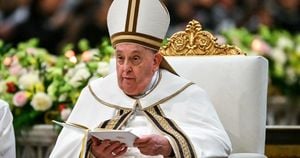The stage is set for the anticipated German Federal Elections on February 23, 2025, following the surprising collapse of Chancellor Olaf Scholz's coalition government late last year. With over 59 million eligible voters, these early elections not only aim to fill the 630 seats of the Bundestag but also to potentially reshape the future of German and European politics.
After requesting the dissolution of the Bundestag, President Frank-Walter Steinmeier has emphasized the importance of voters participating actively. With the stakes at their highest, the upcoming election has garnered intense focus from both domestic and international observers, highlighting what it means for both the country and the broader European Union.
Polling data indicates the current government coalition, led by Scholz from the Social Democratic Party (SPD), is at risk of losing its majority. Leading the charge is Friedrich Merz of the Christian Democratic Union (CDU/CSU), whose party has surged to the forefront of many electoral forecasts. According to recent projections, Merz is favored to become the next Chancellor, mirroring the sentiments shared by him: "Everything will be fine," as he expressed confidence before casting his vote.
Rising alongside the CDU/CSU’s popularity is the far-right Alternative for Germany (AfD), which is reportedly showing promising signs to potentially secure second place. Their platform has driven significant debates around immigration and socio-economic issues, with polls estimating their support may reach as high as 20% of the vote, cementing their presence and influence within the German political spectrum.
The early signs point toward increased voter engagement this time around, with turnout rates expected to outperform the 2021 elections. By early afternoon on election day, around 52% of registered voters had already participated according to the Federal Statistics Office. This contrasts sharply with the just 36.5% turnout during the previous elections, largely attributed to the pandemic’s impact at the time.
Frank-Walter Steinmeier urged the electorate to take on the responsibility of voting, stating, "Use your right to vote, participate in your country's future, and know your choice could be decisive." His call signifies the urgency and potential consequences of this electoral event, with voters urged to make their voices heard.
This election will also feature significant reforms to the electoral process, as recent legislation has capped the number of Bundestag seats at 630, managing the representation of various parties more closely than ever before. To sit within the Bundestag, parties must not only secure more than 5% of the vote nationally but must also see at least three candidates elected from their home regions. This requirement poses risks for smaller parties like the Free Democratic Party (FDP) and the Alliance led by Sahra Wagenknecht (BSW), both of which are hovering on the precipice of representation.
The absence of these smaller parties could have huge ramifications for Friedrich Merz and the CDU as they seek to form coalition agreements. If fewer parties hold seats, Merz may find it easier to establish alliances—potentially leading to another grand coalition with the SPD. Conversely, if these smaller factions manage to breach the threshold, the political dynamic could become vastly more complex as negotiation stakes rise.
Across Germany, roughly 675,000 volunteers have mobilized to facilitate the election, coordinating 65,000 polling stations. Each voter is allowed two votes; one for preferred candidate within their constituency and another for their chosen party. With voting hours concluding by 6PM CET (5PM UTC), the anticipation for preliminary results is palpable.
This election week not only centers around the internal dynamics of German politics but also captures the interests of European capitals, as the outcome will be pivotal for the continent’s political health. The results are likely to reverberate beyond just Germany, influencing decisions and policies as other nations watch closely.
Reflecting on the broader narrative, the 2025 German Federal Elections represent not merely a transfer of power but rather signify the enduring challenges within European politics. The decisions made at the ballot box will echo throughout the Bundestag for years to come, highlighting the significance of each cast vote. With candidates drawing battle lines and the electorate poised to make its decision, all eyes are watching to see how this pivotal moment will shape the future of Germany and its position within Europe.



